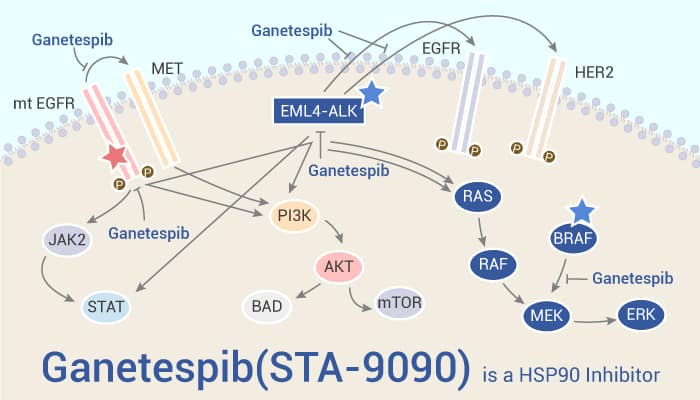Hsp90 is a molecular chaperone that regulates the posttranslational folding, stability, and function of its protein substrates (client proteins), many of which play critical roles in cell growth, differentiation, and survival. The Hsp90 machinery serves as a biochemical buffer for a number of oncogenic signaling proteins causally implicated in a variety of tumors. Cancer cells contain elevated levels of the active form of the Hsp90 complex relative to normal cells. It is selectively sensitive to Hsp90 inhibition. Moreover, a unique characteristic of targeting Hsp90 is that inhibition results in the combinatorial blockade of multiple signal transduction cascades, thereby potentially bypassing pathway redundancies often found in cancer cells. Thus, Hsp90 represents an attractive molecular target for the development of novel cancer therapeutics. Ganetespib (STA-9090) is an HSP90 inhibitor. It exhibits potent cytotoxicity in a wide variety of hematological and solid tumor cell lines.
Ganetespib exhibits potent cytotoxicity in a wide variety of hematological and solid tumor cell lines.

Ganetespib is a novel resorcinolic triazolone compound that is structurally distinct to the first-generation ansamycin Hsp90 inhibitors. It exhibits competitive binding for the ATP pocket at the N-terminus of Hsp90. In addition, Ganetespib retains potency against cell lines expressing mutated kinases that confer resistance to kinase inhibitors that Ganetespib exhibits sustained activity with short exposure times recurrently used in clinical practice. It induces apoptosis in human cancer cells I and exhibits potency against erlotinib-resistant NSCLC tumor phenotypes in vitro. Ganetespib exhibits potent in vivo activity in both solid and hematologic xenograft models.
In summary, Ganetespib is a unique small-molecule Hsp90 inhibitor that exhibits potent and sustained antitumor effects in a broad range of malignancies. It displays optimal pharmacologic properties including high tumor penetration and a favorable safety profile that predict a superior therapeutic index. Accordingly, Ganetespib represents an exciting new targeted agent for the treatment of human cancers.
Reference:
Ying W, et al. Mol Cancer Ther. 2012 Feb;11(2):475-84.